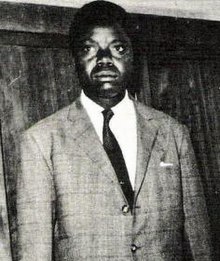Battle of Kabalo
The Katangese forces attacked the town as part of a larger offensive meant to restore their authority in northern Katanga which was challenged by the Baluba.
A United Nations Operation in the Congo peacekeeping contingent garrisoning Kabalo, acting under the authority of their mandate to prevent civil war in the country, resisted the initial attack and arrested 30 mercenaries in Katanga's employ.
On 5 July, disgruntled soldiers of the Force Publique, unhappy with their lack of advancement relative to civilian politicians, began a nationwide mutiny against their white officers.
[1] Katanga contained the vast majority of the Congo's valuable mineral resources and had attracted significant mining activity under Belgian rule.
[2] Many Katangese thought that they were entitled to the revenue generated through the lucrative industry, and feared that under the new central government led by Prime Minister Patrice Lumumba it would be redistributed among the Congo's poorer provinces.
[6][7] Lumumba and President Joseph Kasa-Vubu appealed to the United Nations (UN), requesting that international troops be dispatched to the Congo to replace the Belgian forces and reestablish order.
[8] The UN Security Council complied, passing several resolutions calling for the withdrawal of Belgian troops and establishing a large multinational peacekeeping mission, the United Nations Operation in the Congo (known by its French acronym, ONUC).
[9] Lumumba demanded that ONUC troops be used to forcibly put down the Katangese secession, but the Security Council resolved that "the United Nations Force in the Congo will not be a party to or in any way intervene in or be used to influence the outcome of any internal conflict."
Frustrated, Lumumba appealed to Eastern Bloc nations for military assistance, resulting in a conflict with Kasa-Vubu and ultimately his removal from power in September and eventual murder in January 1961.
[10] In response to Lumumba's removal, his political allies gathered in Stanleyville in the eastern Congo and declared a rival regime to the central government in Léopoldville.
[11] The announcement of Lumumba's death created a sense of urgency among the international community and motivated members of the UN Security Council to strengthen ONUC's powers.
[12] On 21 February 1961 the UN Security Council passed a resolution permitting ONUC to use military force as a last resort to prevent civil war.
It also called for the immediate departure of all foreign military personnel and mercenaries from the country, though the use of force was not authorised to carry out that specific measure.
[17] Since October 1960, northern Katanga was ostensibly a "neutral zone" under the control of ONUC contingents,[18] but in reality they were too weak to exercise authority and were completely surprised by the takeover in Manono.
At the same time, they were to recapture the town of Manono, secure the area south of it, and launch attacks on Kabalo from Albertville to the east and Kongolo to the north.
[22] The Katangese government disregarded the UN Security Council resolution of 21 February and carried forward with its plans to suppress rebellious Baluba in the northern sections of the province.
According to Browne, Ethiopians troops at the railway stationed were angered by the death of their two comrades at the bridge, and a lieutenant brought the mercenaries out of their confinement and prepared to execute them with a firing squad.
In response the United Kingdom government declared that any British national engaged in a military capacity in the Congo outside of service with ONUC would have their passport invalidated.
[23] Due to the action of the ONUC garrison, Kabalo remained the only major town in northern Katanga not controlled by the Katangese Gendarmerie at the conclusion of their offensive.
[23] Puren attributed the defeat of the attack on Kabalo to the alleged leak of the battle plan to ONUC and Browne's decision to surrender his force instead of resisting the Ethiopians until reinforcements arrived.
[30] The ONUC garrison's resistance to the attack at Kabalo and the arrest of the mercenaries marked peacekeepers' first use of the powers granted to them under the UN Security Council resolution of 21 February.
In response to a parliamentary inquiry, the Lord Privy Seal of the United Kingdom wrote that it was the position of the British government that ONUC's action at Kabalo was authorised under the Security Council resolution.
[14] The failure of the UN to convince the Katangese to peaceably dispel mercenaries from its forces led ONUC to commission Operation Rum Punch in August.

